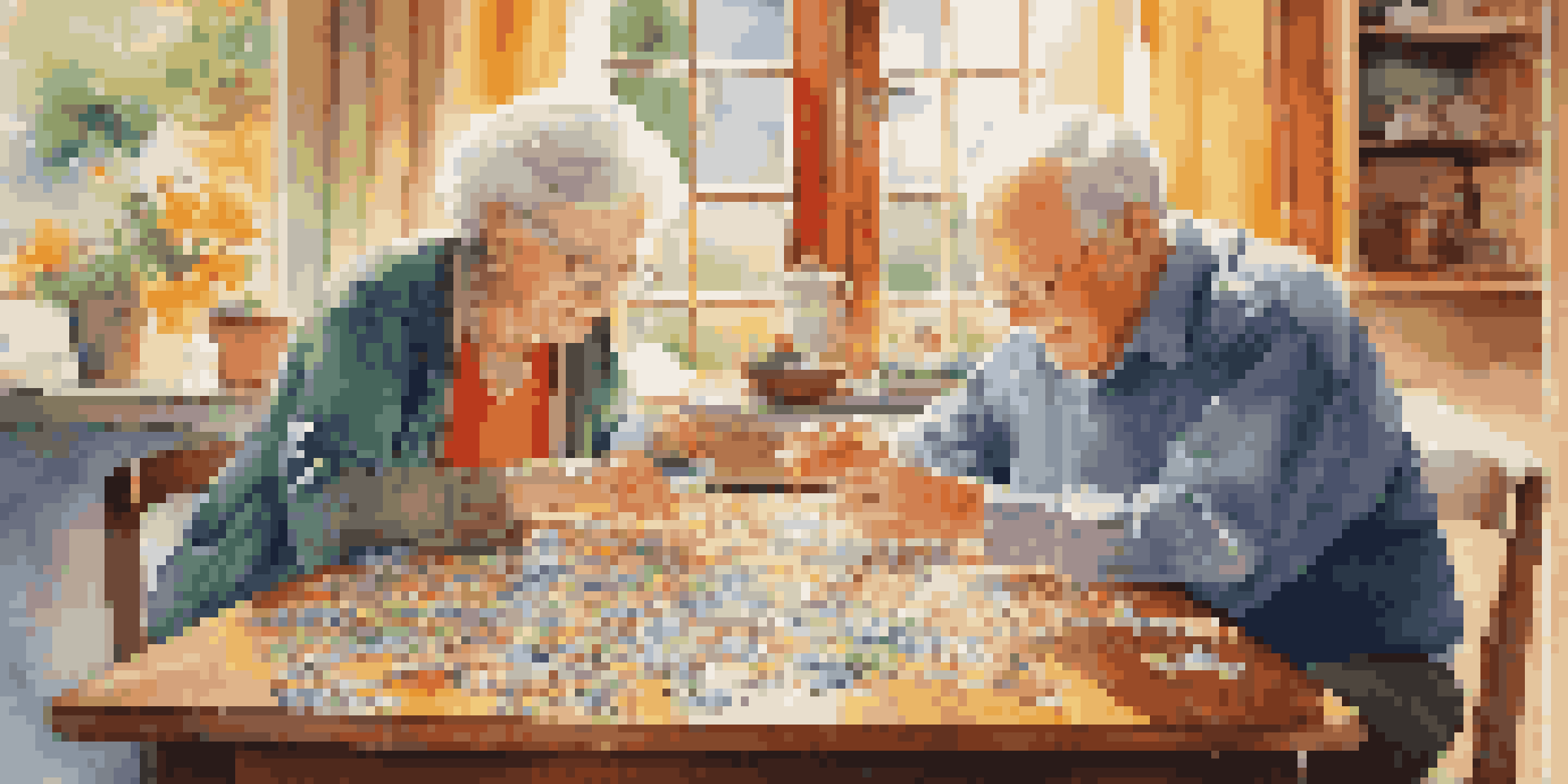Jigsaw Puzzles for Seniors: Fun and Engaging Activities

Why Jigsaw Puzzles Are Great for Seniors
Jigsaw puzzles offer a delightful way for seniors to engage their minds. They stimulate cognitive functions, helping to improve memory and problem-solving skills. Plus, the sense of accomplishment when completing a puzzle can boost self-esteem.
The greatest gift you can give someone is your time, your attention, your love, and your concern.
Beyond mental engagement, puzzles also provide a relaxing activity that can reduce stress and anxiety. The act of focusing on sorting and fitting pieces together can be meditative, offering a welcome escape from daily worries.
Additionally, puzzles can be a social activity, encouraging interaction with family and friends. Whether working together on a challenging scene or sharing stories over completed puzzles, they create bonding opportunities.
Choosing the Right Puzzle for Seniors
Selecting the right puzzle is crucial to ensure enjoyment and engagement. Consider factors such as the complexity, piece count, and theme. For seniors, larger pieces with a lower piece count can be easier to handle and see.

Themes that resonate, like nature scenes or nostalgic images, can heighten interest and engagement. Puzzles that reflect personal interests or memories can spark conversations and reminiscence, making the experience richer.
Puzzles Boost Cognitive Health
Engaging in jigsaw puzzles can enhance memory and problem-solving skills, helping to delay cognitive decline in seniors.
Another important factor is the quality of the puzzle. Durable materials and well-fitting pieces can enhance the overall experience, allowing for repeated use and a satisfying assembly process.
The Cognitive Benefits of Puzzles
Engaging in jigsaw puzzles can significantly boost cognitive health. Research suggests that regular puzzle-solving may help delay the onset of dementia and improve brain connectivity. This makes it a smart choice for seniors looking to keep their minds sharp.
A puzzle is not a puzzle if you can't enjoy the journey of putting it together.
Puzzle-solving involves various cognitive skills such as visual-spatial reasoning, memory recall, and concentration. As seniors work on puzzles, they engage multiple areas of the brain, which can lead to improved mental agility.
Moreover, the satisfaction of successfully completing a challenging puzzle encourages perseverance. This feeling of achievement reinforces positive mental health, making seniors feel more capable and confident in their abilities.
Social Interaction Through Puzzle Solving
Puzzles can serve as a fantastic bridge for social interaction among seniors. Working together on a puzzle can break the ice, encouraging conversation and laughter. It can be an excellent way for families to bond, especially during gatherings.
Community centers and senior living facilities often host puzzle clubs or group activities. These settings provide a chance for seniors to meet new friends while collaborating on puzzles, fostering a sense of community.
Puzzles Foster Social Connections
Working on puzzles together encourages interaction and bonding among seniors, making it a fun social activity.
Sharing the experience of completing a puzzle can lead to deeper connections. The shared triumph of completing a puzzle or discussing strategies can create lasting memories and friendships.
Adapting Puzzles for Different Abilities
It's essential to adapt puzzles to cater to varying abilities among seniors. For those with limited dexterity or vision, consider larger, thicker pieces or puzzles with fewer pieces. This ensures that everyone can participate and enjoy the activity.
Another option is to use puzzle mats or trays that keep pieces organized and easy to access. This can help reduce frustration, making the puzzle experience more enjoyable for those who may struggle with traditional setups.
Additionally, online puzzles and apps can provide a great alternative for tech-savvy seniors. These can be adjusted for difficulty and often include features like zooming in on pieces, making them more accessible.
The Joy of Completing a Jigsaw Puzzle
There’s a unique joy that comes with completing a jigsaw puzzle. The moment you place the final piece can evoke a sense of pride and accomplishment. This feeling is especially meaningful for seniors, as it reinforces their ability to tackle challenges.
Completing a puzzle also provides a tangible outcome that seniors can display. Whether framing the finished piece or simply sharing it with friends, the completed puzzle serves as a reminder of their hard work and perseverance.
Adapt Puzzles for Accessibility
Choosing puzzles with larger pieces and fewer counts ensures that seniors of varying abilities can enjoy the activity.
This joy can be further enhanced by celebrating the completion with family or friends. A simple gathering to admire the finished puzzle can create cherished memories and encourage future puzzle-solving sessions.
Incorporating Puzzles into Daily Routines
Incorporating jigsaw puzzles into daily routines can enhance overall well-being for seniors. Setting aside a specific time each day for puzzle-solving can create a comforting structure and rhythm. It can be a time of reflection, creativity, and fun.
Consider pairing puzzle time with other enjoyable activities, like listening to music or sipping tea. This multi-sensory approach can make the experience more enjoyable and relaxing, transforming puzzle-solving into a cherished ritual.

Encouraging family members to join in can further enrich the experience. This shared time can foster a sense of connection and support, emphasizing the importance of social interaction in maintaining mental health.